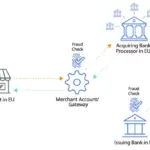In an era where data has become the new currency, the intersection between data privacy and financial technology (fintech) innovation is both complex and crucial. As fintech firms continue to revolutionize financial services with AI, blockchain, and big data analytics, the tightening grip of global data privacy laws poses both opportunities and challenges.
The Rise of Data Privacy Regulations
Over the past decade, a wave of data protection regulations has reshaped how companies collect, store, and use consumer information. The EU’s General Data Protection Regulation (GDPR), implemented in 2018, set the global standard by granting individuals more control over their data and imposing strict penalties for violations. Similar frameworks have since emerged — such as the California Consumer Privacy Act (CCPA) in the U.S., Personal Data Protection Act (PDPA) in Singapore, and Malaysia’s PDPA — all emphasizing transparency, consent, and accountability.
For fintech companies, which thrive on leveraging user data for personalized financial services, fraud detection, and credit scoring, these regulations demand a delicate balance between compliance and innovation.
How Privacy Laws Shape Fintech Innovation
1. Encouraging Responsible Innovation
While initially seen as restrictive, data privacy laws can actually foster innovation by promoting ethical data use. Fintech firms are encouraged to design products with “privacy by design” — embedding protection mechanisms from the start rather than as an afterthought. This approach not only builds customer trust but also opens new opportunities for secure data-sharing technologies such as data anonymization and differential privacy.
2. Shifting Focus to Transparency and Consent
Fintech players are being pushed to create clearer, more user-friendly consent processes. This shift toward greater transparency strengthens consumer confidence — a critical asset in the financial sector. Startups that can offer privacy-respecting yet data-driven services are gaining a competitive edge.
3. Challenges for Data-Driven Models
However, compliance comes with costs. Stricter laws can limit access to the vast datasets required for AI algorithms and machine learning models, potentially slowing product development. For example, fintech lenders using alternative data for credit scoring must ensure that all data sources comply with local privacy laws — a complex task across multiple jurisdictions.
4. Cross-Border Compliance Complexity
Global fintechs face additional hurdles navigating differing regulatory landscapes. What’s permissible under Singapore’s PDPA may not align with the EU’s GDPR or the U.S. CCPA. This fragmentation increases compliance costs and requires companies to implement localized data governance frameworks.
Emerging Solutions: Privacy-Enhancing Technologies (PETs)
To navigate these challenges, fintech innovators are turning to privacy-enhancing technologies. Techniques such as homomorphic encryption, federated learning, and secure multiparty computation (SMPC) allow companies to analyze data without directly accessing it. These tools are reshaping the future of compliant data innovation — enabling insights while preserving user privacy.
For instance, a fintech firm can train its fraud detection model using encrypted data from multiple banks without any institution sharing raw data — ensuring both security and accuracy.
Building a Privacy-First Future in Fintech
As regulators and fintech innovators continue to evolve, a new paradigm is emerging: privacy as a competitive advantage. Companies that proactively adopt transparent, compliant, and ethical data practices are more likely to earn user trust and regulatory goodwill.
Ultimately, the goal isn’t to choose between innovation and privacy — it’s to integrate both seamlessly. Fintech’s future will depend on its ability to innovate within the framework of data protection, not outside it.
Conclusion
Data privacy laws are reshaping the fintech landscape, setting higher standards for how companies manage consumer data. While compliance challenges exist, these regulations also drive a new wave of responsible innovation. Fintech firms that embrace privacy not as a limitation, but as a foundation for trust and growth, will lead the next generation of digital finance.














